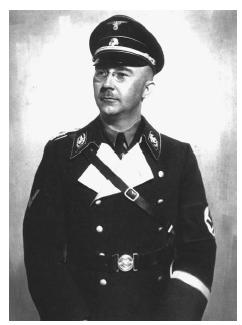Gestapo
█ ADRIENNE WILMOTH LERNER
The Geheime Staatspolizei , or Gestapo, a German secret police force, was created in 1933 after Adolf Hitler became chancellor of Germany. The Gestapo was created to help solidify Nazi control by identifying and arresting anti-Nazi agents in Germany. The agency was restructured several times during its twelve year history and was instrumental in perpetrating the Nazi deportation and destruction of European Jews during the Holocaust.
Hitler named Herman Göring the director of the Gestapo soon after its founding. Göring encouraged his officers to root out and arrest leftist sympathizers, especially communists, whom he considered a threat to the Nazi government. He also oversaw the Gestapo's enforcement of the anti-Semitic Nuremberg Laws. In 1936, Heinrich Himmler, head of Hilter's special forces unit, the Schutzstaffel (SS), was given command of the Gestapo and the Kriminalpolizei , or Kripo.
In 1939, in the months prior to the beginning of the second world war, Hitler reorganized the German armies. The Gestapo was integrated, with the rest of the Nazi police and intelligence organizations, into the Reichssicherheitshauptamt (RHSA) under the direction of Reinhard Heydrich. Though officially part of the Reich Security Central Office, the organization remained popularly known as the Gestapo.
At the outbreak of the Second World War in 1939, there were approximately 40,000 Gestapo agents in Germany. As the war progressed and the Nazis gained territory throughout Europe, the Gestapo swelled to employ over 150,000 informants, agents, and accessory personnel. Gestapo agents were charged with rooting out foreign agents and resistance fighters, but they also expanded their role as an internal police force. Gestapo agents and informants concentrated on finding suspected political dissidents of the Third Reich. Spying on citizens became pervasive, and the Gestapo encouraged people to turn in "suspect persons" to local authorities. While victims of the Gestapo were subject to both civil and criminal prosecution, the secret police themselves operated above the law. On February 10, 1936, the Nazi government officially decreed that the organization was not subject to judicial review. There were no legal restraints on detention of suspects, evidence collection, or police violence. This lack of legal restraint, paired with the Gestapo's tendency to attract and employ Nazi extremists and former criminals

in its ranks, permitted the brutality for which the force became infamous.
The Gestapo also aided intelligence work during the war, but the department was secondary to the Sicherheitsdienst (SD), or Security Service. The department employed counter-intelligence agents, ciphers, and oversaw a vast network of informants in Allied countries. In the occupied territories, the Gestapo infiltrated partisan resistance groups. The organization also aided the massive Nazi propaganda campaign both before and during the war.
Intelligence, security, and police forces often over-lapped in jurisdiction during the Nazi regime. Several departments performed the same functions, and were often in conflict with each other. The Abwehr, the intelligence service under the direction of spymaster Wilhelm Canaris, negotiated an agreement with the SD about their respective roles. Despite the agreement, both organizations maintained their own network of spies and informants, and did not often coordinate their international operations. In 1943, Canaris and several other key members of the Abwehr joined the Resistance movement against the Nazi government. Canaris used the Abwehr intelligence network to leak secrets and troop positions to the Allies. The Gestapo investigated Canaris and the Abwehr, and in 1944, after a failed attempt to assassinate Nazi leader Adolf Hitler, liquidated the Abwehr intelligence service. Canaris and his followers were executed. The discovery of the July Plot to assassinate Hitler, and Canaris' spy ring was a key counter-intelligence victory for the Gestapo, SD, and RHSA.
The Gestapo, as well as its parent organization, the SS, aided the Einsatsgruppen , or mobile killing units, responsible for the massacre of nearly one million Jews during the Holocaust. Gestapo and SS members also tracked down refugees in hiding and policed ghettos and concentration camps. After the war at the Nuremberg trials of Nazi war criminals, the Gestapo was named as one of the chief institutional perpetrators of the Holocaust.
The Gestapo was dissolved with the fall of the Third Reich in 1945.
█ FURTHER READING:
BOOKS:
Browder, George C. Hitler's Enforcers: The Gestapo and SS Security Service in the Nazi Revolution. Oxford: Oxford University Press, 1996.
Gellately, Robert. The Gestapo and German Society. Oxford: Oxford University Press, 1991.
SEE ALSO
French Underground during World War II, Communication and Codes
Germany, Intelligence and Security
World War II
Comment about this article, ask questions, or add new information about this topic: